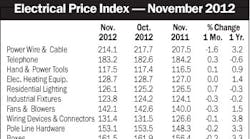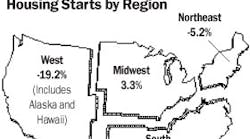NEMA’s Electroindustry Business Confidence Index (EBCI) for current conditions in North America climbed to its highest level in more than a year in August. North American business sentiment strengthened to 66.7 points, jumping from July’s 62.9 point reading, and marking the 28th consecutive month in which current conditions have registered in excess of the 50-point threshold indicating growth in the electrical market.
Results in the future conditions index hinted at more positive news to come, with a reading of 70.4 points, its highest since March of this year. The EBCI is a monthly survey of senior executives at member firms of the National Electrical Manufacturers Association (NEMA), Rosslyn, Va.
Although the EBCI numbers and several recent economic indicators were positive, comments from electrical manufacturers in this month’s survey were mixed, and revealed an undercurrent of disappointment and uncertainty regarding the current state of and outlook for parts of the nonresidential construction sector.
Fears of rising oil, freight, and raw materials costs remain a moderating influence on confidence in conditions six months from now. On the policy front, respondents were concerned about the Federal Reserve’s rate hikes. Said one manufacturer, “The Fed seems intent on killing the positive momentum in the economy.”
Some manufacturers say the positive economic indicators don’t reflect the conditions in the electrical construction market. “Unless the commercial construction sector settles into a stronger position, 2005 will be worse than 2004,” said one manufacturer. “The politicians and Fed keep talking up the strength of the economy, but I sometimes wonder what country they are talking about.”
Other respondents were more optimistic. “Commercial construction should improve with the steady drop in vacancy rates,” said a manufacturer. Another source of optimism was the potential impact of the energy bill. “There is optimism about infrastructure spending to improve utility reliability,” said one respondent.

